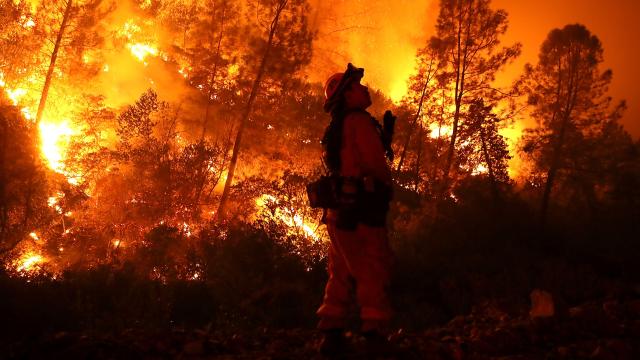The top lobbying group for the wireless communications industry is fighting against legislation that would effectively ban the supremely shitty business practice of throttling mobile data for first responders during a state of emergency in the U.S.
The legislation exists because, last year, exactly this thing happened. In August 2018, as the Santa Clara County Fire Department fought vast and devastating wildfires in the state, more than twice the cost.”
California bill AB-1699, introduced by Assemblymember Marc Levine, would prohibit mobile internet service providers from “impairing or degrading the lawful internet traffic of its public safety customer accounts, subject to reasonable network management, during a state of emergency,” according to the bill text. This includes an emergency declared by the president of the United States, the governor, or a local governing body or individual.
The CTIA, the lobbying group opposing the bill, wrote a letter on April 17 outlining the ways in which it believes the bill is flawed. It states that the phrase “not impair or degrade” is “ambiguous,” that only the president and the governor should be able to declare a state of emergency, that these authorities as well as the “holder of the affected public safety account” should be required to inform service providers both that an emergency has been declared and the scope of it, and lastly, that the bill shouldn’t fall under the Public Utilities Code but rather the Office of Emergency Services.
Of course, CTIA, which represents Verizon, AT&T, Sprint, and more, is trying to paint their opposition as good for first responders.
“We appreciate the amendments the author has offered to make, however the bill’s vague mandates, problematic emergency trigger requirement and failure to include notification requirements could work to impede activities by first responders during disasters,” the CTIA wrote in the letter.
According to a committee analysis from a hearing on Wednesday, the CTIA was the only group registered in opposition of the bill. The California Central Valley Flood Control Association, California Fire Chiefs Association, California Professional Firefighters, County of Santa Clara, Electronic Frontier Foundation, Fire Districts Association of California, and Public Advocates Office all registered in support of the bill.
“An essential component of emergency communication in the modern fire service is transmission and receipt of data […],” the California Professional Firefighters said in a statement of support for the bill, according to the committee analysis. “Throttling data service can be disastrous to the public’s safety. Indeed, an [ISP’s] manipulation, or ‘throttling,’ of the data rates can render a fire department’s needed communication resources virtually useless during an emergency […] At a time when firefighters are attempting to save lives and property, they cannot afford the added danger – to the safety of the public as well as their own safety – of unnecessary interferences in the technology they rely on to do their jobs and keep civilians and themselves safe.”
Given the unfortunate reality of increasingly devastating wildfires in Calfornia, legislation that serves to prevent billion-dollar corporations from making the job of emergency responders even harder at the most crucial moments is vital. It’s hardly surprising that Big Telecom would feel threatened by a bill that might hurt its bottom line or make its current arsehole business model slightly less easy to execute.
“CTIA did oppose the bill but committed to work with Assemblymember Levine to address their concerns,” Terry Schanz, State Assemblymember Marc Levine’s chief of staff, told Ars Technica. “We are confident that we will be able to reach an agreement between first responders and wireless data providers to ensure that first responders have every tool available to them necessary to keep the public safe during an emergency.”
According to Ars, the bill advanced with a 12-0 vote and is headed to an April 30 hearing with the Assembly Privacy and Consumer Protection Committee.
